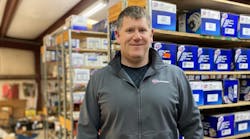Frank Granieri is the COO of A. Duie Pyle, a Northeast transportation and logistics provider. Granieri spoke to Aftermarket Business World about supply chain technology, outsourcing, and logistics challenges facing the aftermarket.
Real-time information … Automated geofences and delivery notifications help reduce effort of our customers for track and trace functions by a GPS-powered automatic gate in and gate out procedure at delivery locations. With custom technology development increasing, we are able to partner with clients and incorporate the “voice of the customer” in the design phase rather than delaying feedback until deployment when changes may be costly or illogical.
Q. Returns are an ongoing challenge in the aftermarket (and in the general retail supply chain). What types of strategies have emerged to help companies deal with returns more effectively? Is this function frequently outsourced?
We utilize unique Handling Unit IDs (HUIDs). [It’s important to have] the flexibility to allow customers to return purchases or cores to brick and mortar locations even when the purchase was made online, [and] the ability to develop simple shipping solutions for the brick and mortar locations to move the returns out in a timely fashion to locations that can process them, as opposed to working to process them locally.
Q. Last-mile delivery is also becoming more important, particularly as more companies shift to same day delivery. What strategies are helping companies achieve their delivery window goals? How can logistics companies help enable these strategies?
Technology and density are the keys to same-day service – technology that will help the logistic company provide the most economical solution as opposed to a “one size fits all” solution that does not use the synergy of multiple shippers needing a similar service, in the same time frame to provide the most efficient solution. Pyle provides our customers the technological benefit of dynamic routing and design within operations, and our real estate and fleet assets including cross-dock, fulfillment centers and diverse delivery equipment enable us to effectively serve the complex and congested Northeast metropolitan markets.
By continuously redesigning route plans, we improve our performance to customer specific performance measures. Partnering with customers to develop their own unique Key Performance Indicators (KPIs) allows our final mile delivery fleets to focus on the targets most important to each client specifically.
Q. What are some of the key challenges that outsourcing distribution can address for aftermarket companies?
Cost and service. Outsourcing to logistics providers that can leverage relationships with multiple customers to provide customized solutions that meet the specific service requirements, without forcing one customer to bear all the costs caused by not having the density to drive the most efficient solution is one advantage.
Another is the logistics company has technology that is tailored to their core competency and they stay current with new technologies because it is their core business. Companies that do their own distribution many times do not invest in new technology because it is expensive, and thus, over time, fall behind their competition.
Driver recruiting and retention is a challenge plaguing an industry that has been heavily influenced by driver shortages, increasing regulation and high volatility. At Pyle, our culture of discretionary effort is a differentiator within the industry. In addition, our private ownership and financial stability allows us to offset capital deployment challenges for aftermarket companies who want to focus their investment in their products rather than assets required for distribution.


